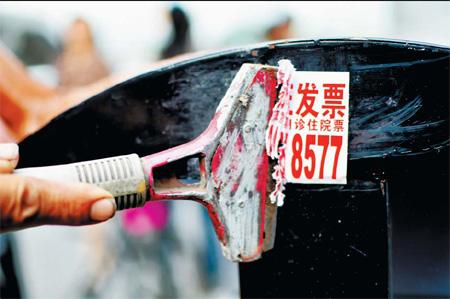
An advertisement for fake invoices is removed from a rubbish bin in Haidian district. [China Daily]
Dodgy vendors are once again hawking fake tax invoices on the streets of Beijing, as workers scramble for receipts to bolster their yearly bonus.
METRO recently witnessed several vendors selling fake or second-hand receipts, known as fapiao in Chinese, at popular destinations, including Wangfujing, near Tian'anmen Square.
Reimbursed expenses from invoices are a major source of income for many employees at many organizations and enterprises. It is an open secret that many employees collect fapiao receipts to boost their "gray income", which is not included in their salary.
In December, fake invoices become very popular as employees attempt to boost the sum of their annual bonus.
A vendor in Wangfujing said she has had an increase in the number of customers this month. The 100 yuan restaurant invoice is the most popular, and she said she often sells more than 12 at a time.
"It is the same every year. More people want the receipts, so they usually sell well near year-end," said the woman.
She charges 50 yuan for 10 100-yuan restaurant invoices and buyers can get a discount if you buy more. She claimed the invoices were from genuine transactions at the Peninsula Beijing hotel.
However, one buyer who purchased the invoices, told METRO they are fake.
"The accountants at my organization rejected the invoices. They said they are fake," said the buyer.
The invoice, seen by METRO, uses the same printing as is on the official invoice used by the local taxation bureau. However, the red seal of the Peninsula Beijing looks fake.
METRO later checked the invoice's serial number on the Beijing local taxation bureau's website. A message on the website said it had no record of the invoice and warned that the invoice is fake.
When METRO asked the woman about the website message, the woman declined to answer and hung up the phone.
Wangfujing police said it had not noticed vendors selling fake invoices nearby, but a policewoman said they would send out officers to track them down.
"Such vendors always try to take a risk as the year ends when more people visit Wangfujing and other popular sites," said the officer, who refused to give her name.
Several employees told METRO that the refunded expenses constitute about 10 percent of their monthly income and even more in their year-end bonus.
"If I don't get enough receipts by this week, I won't get my year-end bonus," said an employee with a government organization, who was looking for 1,000 yuan worth of restaurant receipts. The 1,000 yuan makes up about 10 percent of her bonus and is equivalent to a month's salary.
"If it leaves me no choice, I may have to go talk to a street vendor," she said.
Other workers at State-run enterprises and institutions said they were collecting phone bills, transport bills and bills entitled "office supplies" from friends.
"The first thing I did at a friend's gathering last Saturday was collect 'fapiao' from everybody," one said.
Most institutions ask employees to produce invoices from transport fares, mobile phone bills, and hotel receipts.
The practice of reimbursement reduces the tax burden on government and commercial institutions, financial analysts said. To tighten tax invoice control and crackdown on fake invoices, the national taxation authority announced it would print new tax invoices from next year. The new ones will replace the current invoices by 2010.





